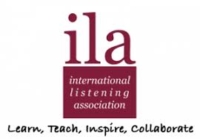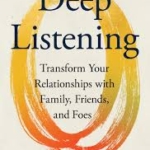
I hadn’t thought about the importance of listening in social change work until recently.
Now, I’m beginning to see that if I learn to listen better (for a change) I can use listening for (sparking) change—including producing the kind of paradigm shift I’ve been ranting about since I was in college.
Of course, anyone who has spent as much time as I have in peacebuilding and conflict resolution circles knows about active listening and the like.
Still, I had never seen listening as something I needed to focus on until I started noticing something about myself and then got two unexpected invitations that brought it back into my clichéd frontal lobes.
Were My Skills Declining?
I’ve always been a pretty good listener.
It comes in part from having grown up in a dysfunctional family in which reading between the lines of what my parents said and did helped me cope.
Then, as a camp counselor and professor, I realized that I helped my campers and students best if I really listened to what they had to say. Fully. Before I said anything. And everything that came with listening like empathy.
All of this happened even before I got some training in active listening when I started teaching, conducting workshops, and writing about conflict resolution and peace studies forty years ago.
For most of that time, I found it pretty easy to listen well in large part because I rarely played anything resembling a leadership role outside of the classroom. I enjoyed—as I liked to put it—lead from behind in which I listened a lot before I said much of anything.
That has changed gradually but dramatically over the last twenty years or so. Maybe I just know more. Maybe I’ve become more self-confident.
Whatever the cause, I now have and enjoy having more active leadership roles in almost everything I do.
It isn’t that I have forgotten how to listen.
However, I do talk more. More often than was the case even ten years ago, I set the tone or and even introduce new points into discussions. If nothing else, I find myself planning what I’m going to say—and they saying it—far earlier in the life history of a charged conversation than I used to.
I don’t listen as effectively as I once did because I don’t all but automatically use my listening skills.
In short, gnawing at the back of my mind was an unspoken sense that maybe I should revisit how I listen.
The International Listening Association Convention
Inertia and a jam-packed schedule being what they are, I didn’t do anything about that gnawing sensation until I recently got two invitations.
The first is to give what they have called a TED-like talk at this year’s convention of the International Learning Association at the end of this month. I had never heard of the association until Annie Rappeport asked me to speak. I had met her because of promising work she has been doing on college campuses and wanted to get to know her better. Besides, my book will be coming out by the end of the September, I’m eagerly accepting any opportunity to publicize it.
I still don’t know what to expect, including how many people will be in the room.
However, I know that I will focus on how my book talks to two of their four themes as encapsulated in their acronym SONG. I’ll do a lot with “self” and “other” but don’t think I’ll spend a lot of time on either “nature” or “greater power.”

That said, because of a quirk in my schedule, they have had to move my presentation to the final day of the conference.
That means I can spend a lot of time listening before I have to say anything that will go on the record. I also plan to start the talk by asking members of the audience to suggest what the phrase “peacebuilding starts at home” suggests to people who emphasize listening in their day jobs. Unless that violates their version of TED’s rules….
Even before I hear what they have to say, I should have a better sense of how I should adapt the key themes in the book to fit their interests and needs, including:
- How the realities of life in the twenty-first century are leading more and more of us to see the need for a paradigm shift in human relations
- Any such change has to start with individuals who decide to change themselves in the light of those new realities
- The Alliance for Peacebuilding and its partner organizations in what I will be calling the Peacebuilding Starts at Home Hub will provide “on ramps” for my listeners/readers and others to take in accepting the invitation that is at the heart of my book
- How all of our partners can take these new ways of thinking and acting to scale
- Until they lead to the adoption of sweeping new cultural norms and new policies in both the public and private sectors
Emily Kasriel’s Lessons
Then, also to my surprise and delight, I got a second invitation.

This one came from my friends at the Next Big Idea Club who asked me if I would be willing to read and consider promoting Emily Kasriel’s new book, Deep Listening, which was to be published at the end of June. I quickly looked her up and saw that she had been a journalist and then a coach at the BBC World Service which is arguably the world’s premier news organization. So, even though Gretchen and I would be moving while I should have been reading her book, I agreed.
 Alas, it took me longer than it should have to finish Deep Listening, but I’m sure glad I did because it will help me preparing my talk to the professional listeners and in my work in general.
Alas, it took me longer than it should have to finish Deep Listening, but I’m sure glad I did because it will help me preparing my talk to the professional listeners and in my work in general.
I can’t do her book justice here. It’s enough to hint at how her eight main suggestions to help us listen better can help me avoid the traps I found myself falling into more often these days:
- Create space. Don’t try to convince the other person that you’re right. Instead, broaden the topic you are talking about. Turn it into genuine questions. And demonstrate that you haven’t completely made up your own mind.
- Listen to yourself first. In other words, to the degree that you can, think about what you are going to say before you say it by thinking about how your works are likely to land.
- Be present. Don’t be distracted or even look as if you’re distracted. I’ve always done pretty well on this front.
- Be curious. Again, don’t try to score points. Ask yourself why your interlocutor thinks that way. Better yet, ask them to tell you directly. And take them seriously. Even if you disagree. Especially if you disagree.
- Hold the gaze. Maintain eye contact. I’m not very good at this. Especially in a crowded room in which side conversations grab my attention now that my hearing is not what it used to be.
- Hold the silence. Despite all of my years in the classroom, I hate what I think of as awkward silences. Even though I know that I need time to think through my own answers to tough questions, I get impatient when people don’t react to mine right away.
- Reflect back. This is what my (and Emily’s) friend Amanda Ripley has in mind when she talks about looping. Make certain that you actually “heard” what the person you are talking with had to say by repeating it back to them.
- Go deeper. If I’ve learned anything from being a camp counselor or a college professor or a peacebuilder, it is that serious discussions on difficult topics take a long time. If I want to know why you and I disagree on something that really matters to both of us like climate change or the state of American democracy, we will have to go back and forth a lot of times typically over a lengthy period of time
Changing the Way I Listen
I rarely write about something before I actually do it.
However, in this case, I realized that both Emily’s lessons and the challenges of preparing for my talk two weeks from now both were going to require doing some serious homework in advance.
And I have a great lab to practice in. As I said earlier, we just moved into a new condo complex. Most of the units are still empty. Still, we’ve met a lot of new people in the last few weeks.
I’ve done a lot of listening. And less talking than I might have otherwise. And, I think, begun to have an impact on at least some of our new friends because they have realized that I take them seriously in part because I listen to them.
The views and opinions expressed in this article are those of the author and do not necessarily reflect the official policy or position of the Alliance for Peacebuilding or its members.
